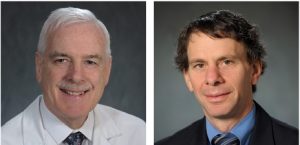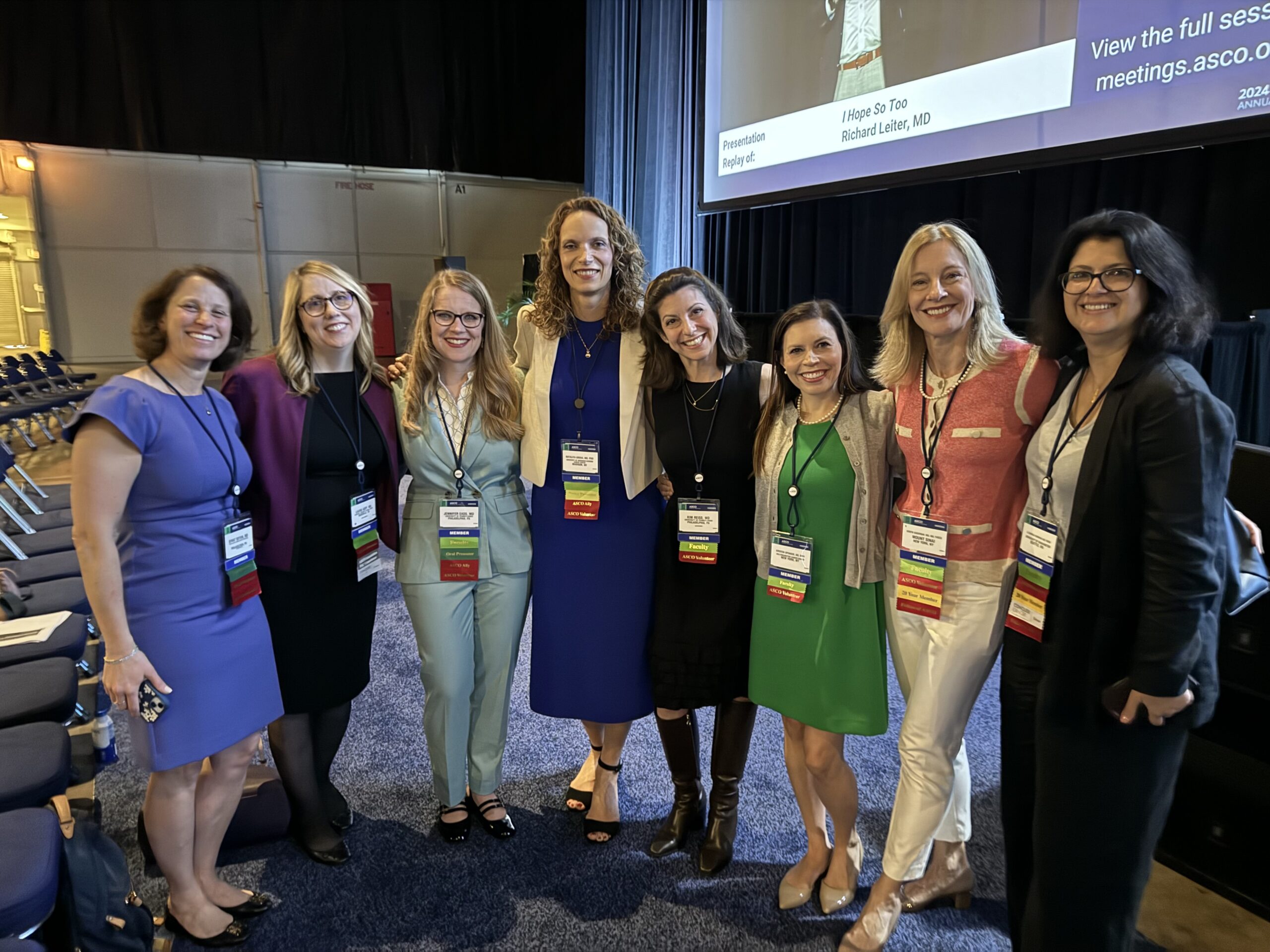
Amended Trial: Nataliya Uboha Gives an Update on the EA2183 Trial for Patients with Esophageal and Gastric Adenocarcinoma
July 3, 2024
News in Brief, August 2024
August 14, 2024From the Co-Chairs, July 2024


By Peter J. O’Dwyer, MD (left)
and Mitchell D. Schnall, MD, PhD

Jennifer Eads, Nataliya Uboha, Kim Reiss,
Kristen Spencer, Karen Goodman, and
Gabriela (Gabi) Chiorean
As summer begins and temperatures heat up across much of the country, the flurry of spring meeting activity aptly cools down. In the last issue, we shared key highlights from the ASCO 2024 Annual Meeting—but before leaving the topic entirely, we draw your attention to the excellent representation of ECOG-ACRIN researchers at the Gastrointestinal Cancer—Gastroesophageal, Pancreatic, and Hepatobiliary Oral Abstract Session. As you’ll see in the News in Brief, five ECOG-ACRIN investigators (pictured here with colleagues) featured prominently in the session: Drs. Efrat Dotan, Jennifer Eads, Nataliya Uboha, Kim Reiss, and Kristen Spencer, the latter two serving as session co-chairs. We applaud them for a successful session and the impactful research presented.
In this issue, we highlight an innovative real-world data study initiative coming soon from PrECOG. The study, PrE1702, will be led by Dr. Suzanne Cole (UT Southwestern Medical Center), while the committee responsible for overseeing such projects, the ECOG-ACRIN Real-World Data (RWD) Committee, is led by Dr. Al Benson (Northwestern University/Robert H. Lurie Comprehensive Cancer Center). The RWD Committee has been active in defining the directions for studies in this arena, and in engaging both academia and industry in a multidisciplinary dialogue on their importance and their incorporation into our research activities. The twin rationales are compelling: first, the FDA has taken the lead in seeking to know how effective the new therapies are that they approve when applied in a broad population—one that differs from the carefully selected patients who are registered to phase 3 trials. (Remember, just three percent of patients with cancer participate in clinical trials, a number that has not changed in 25 years.) The second rationale is that, using multiple approaches, we are now in a position to learn from the outcomes of a broader and more representative population, certainly of the order of 30% instead of three.
PrE1702 is the first trial in this model, funded by a grant from the FDA. The study addresses the future of RWD and recognizes that, even after years of experience, we still have an incomplete picture of the real-world effectiveness of many of our commonly-used therapies. If we are to understand RWD for novel therapies, we need to build databases of our existing regimens. Our grant proposed a strategy of performing a real-world analysis of control arms of selected phase 3 trials. The first will be performed in parallel with EA5182, a randomized trial of osimertinib versus osimertinib with bevacizumab in patients with EGFR-mutated non-small cell lung cancer. Because during the writing of this study data emerged suggesting that osimertinib plus chemotherapy might be better than osimertinib alone, we included a real-world assessment of the combination. This study, which will simply collect data on patients receiving standard-of-care treatment, will recruit 500 patients. We plan to open the trial in up to 60 institutions.
Finally, we welcome the appointment of Dr. Shaalan Beg as senior advisor for clinical research at the National Cancer Institute. Dr. Beg is vice president of Oncology at Science 37, a clinical research company that specializes in decentralized clinical trials. He is a gastrointestinal medical oncologist and was previously medical director of the Clinical Research Office at UT Southwestern and the Simmons Comprehensive Cancer Center. A longtime ECOG-ACRIN member, he has held various positions on the Gastrointestinal Cancer Committee.
Read the July 2024 issue here.
![ECOG-ACRIN logo[19516]275×75](https://blog-ecog-acrin.org/wp-content/uploads/2021/03/ECOG-ACRIN-logo19516275x75.png)
